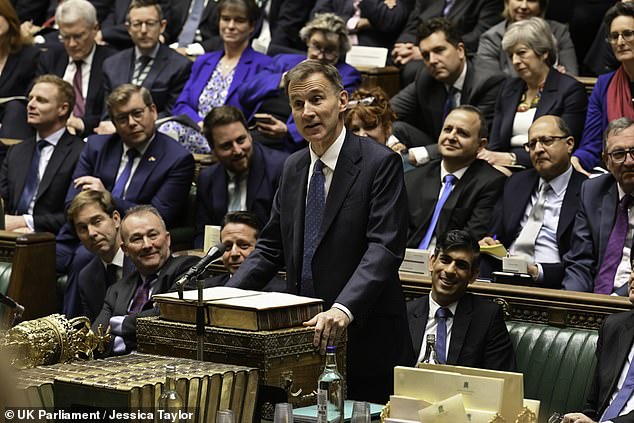Boost for retirees as Jeremy Hunt sticks to the triple lock pledge with a big state pension lift
- Under the pledge it will rise by £902 a year from April next year
Pensioners got a boost after Jeremy Hunt announced the state pension will rise by an expected 8.5 per cent next year.
It will rise by £902 a year from April next year under the government’s ‘triple lock’ pledge, taking it to £11,500 before the next election.
However, the increase means that more than 500,000 pensioners will have to pay taxes for the first time.
The triple lock pledge, a key pillar of the Tory manifesto at the last election, guarantees that the state pension will rise each year at the highest rate of inflation, wage growth or 2.5 per cent.
There were concerns that ministers would increase pensions by a lower amount next year by excluding NHS and civil service bonuses, after predictions that fully honoring the triple lock would cost £8 billion. But ministers chose to keep pensioners, seen as key Tory voters, aside ahead of the general election.
The state pension will rise by £902 a year from April next year under the government’s ‘triple lock’ promise, taking it to £11,500 ahead of the next election (Stock Image)

The triple lock pledge, a key pillar of the Tory manifesto at the last election, guarantees that the state pension will rise each year at the highest rate of inflation, wage growth or 2.5 per cent (Stock Image)
Announcing the increase, Mr Hunt told MPs: ‘There have been reports that we would increase (the triple lock) by a lower amount to smooth out the effect of the high public sector bonuses in July, but that would have been particularly difficult for the 1 million pensioners whose only income comes from the state.
“So instead, today we are fully delivering on our commitment to the triple lock.” He added: ‘This is one of the largest ever cash increases to the state pension, showing that a Conservative government will always support our pensioners.’
He said the triple lock had lifted 250,000 older people out of poverty since it was introduced by David Cameron in 2011.
Pensioners on the full new state pension – paid to those who reached retirement age after 2016 – will get a £17.35 per week increase, taking their weekly income from £203.85 to £221.20 from April. This equates to £11,502 per year, up from the current £10,600.
However, the increase will bring millions closer to the upper limit of their personal allowance, the point at which you pay income tax.
The threshold has been frozen at £12,570 until 2028, in a secret tax trap that means pensioners can only get an income of £1,068 a year on top of the state pension before income tax comes into effect.

Autumn statement from Chancellor of the Exchequer Jeremy Hunt on 22 November 2023
Steve Webb, a former pensions minister and now a partner at consultancy LCP, has estimated that an 8.5 per cent increase would increase the number of tax-paying pensioners to 9.15 million – adding a further 650,000 to the tax net.
More than 750,000 retirees have already been forced to pay tax on their pension income in the past tax year.
The number of tax-paying pensioners has risen from 7.73 million to 8.5 million as a result of the increase in state pensions in April, figures from HM Revenue & Customs show.
Many people whose pension income is higher than the allowance will not see the AOW increase fully and will have to pay 20 percent of it to the tax authorities.
Basic rate taxpayers in this position will take home just £722 of the £902 increase, with HMRC reclaiming £180 of income in taxes.
Claire Trott, of financial adviser St James’s Place, said: ‘The increase in the state pension will be eroded by taxes and pensioners will only really benefit from a 6.8 per cent increase in the money they have in their pockets.’
Next year’s increase will add around £7.65 billion to the Treasury’s pension account, prompting further debate over the sustainability of the triple lock mechanism.
Tom Selby of stockbroker AJ Bell said: ‘Given the Conservatives’ position in the polls and the fact that older people have significant influence at the ballot box, it is not surprising that they have chosen to focus budget discipline elsewhere.’

